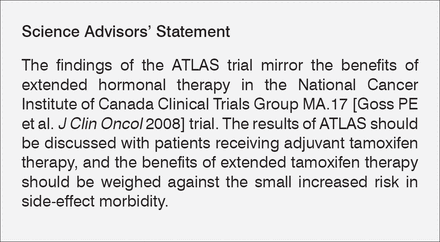Summary
Treatment with tamoxifen for 5 years has substantially reduced the risk of breast cancer recurrence and death throughout the first 15 years after diagnosis of estrogen receptor (ER)-positive early breast cancer [Early Breast Cancer Trialists' Collaborative Group (EBCTCG). Lancet 2011]. The Adjuvant Tamoxifen: Longer Against Shorter [ATLAS] trial compared the effects of continuing tamoxifen for a total of 10 years with stopping after the standard 5 years of treatment. This article presents data from the ATLAS trial on the effect of tamoxifen on 15-year survival [Davies C et al. Lancet 2012].
- Oncology Clinical Trials
- Breast Cancer
Treatment with tamoxifen for 5 years has substantially reduced the risk of breast cancer recurrence and death throughout the first 15 years after diagnosis of estrogen receptor (ER)-positive early breast cancer [Early Breast Cancer Trialists' Collaborative Group (EBCTCG). Lancet 2011]. The Adjuvant Tamoxifen: Longer Against Shorter [ATLAS] trial compared the effects of continuing tamoxifen for a total of 10 years with stopping after the standard 5 years of treatment. Richard Gray, MSc, University of Oxford, Oxford, United Kingdom, presented data from the ATLAS trial on the effect of tamoxifen on 15-year survival [Davies C et al. Lancet 2012].
Women with ER-positive breast cancer (n=6846) who had received 5 years of adjuvant tamoxifen treatment were randomized to continue tamoxifen for another 5 years or to stop at Year 5 (control). Breast cancer recurrence, any other new primary cancer, compliance, hospital admissions, and cause of death were recorded during annual follow-up exams, with a median follow-up of 8 years.
Compliance to treatment was ∼80%. During the trial, 617 women in the 10-year tamoxifen group experienced a recurrence compared with 711 women in the 5-year tamoxifen group (p=0.002). Breast cancer mortality during the trial period was significantly lower in the 10-year group compared with the 5-year group (331 vs 397; p=0.01). Overall mortality was also significantly lower for the 10-year group (639 vs 722; p=0.01). The reductions in adverse breast cancer outcomes appeared to be relatively smaller earlier, with a recurrence rate ratio (RR) of 0.90 (95% CI, 0.79 to 1.02) during Years 5 to 9 and 0.75 (95% CI, 0.62 to 0.90) after Year 10, and breast cancer mortality RR of 0.97 (95% CI, 0.79 to 1.18) during Years 5 to 9 and 0.71 (95% CI, 0.58 to 0.88) after Year 10 [Davies C et al. Lancet 2012].
As the study of 10 years of tamoxifen compared with no tamoxifen has not yet been conducted, the authors combined data from the ATLAS trial and the EBCTCG meta-analysis (n=10,645), which compared 5 years of tamoxifen with no tamoxifen. The breast cancer death RR by period is shown in Table 1.
Breast Cancer Death Rate Ratios: ER-Positive Disease by Period.
Endometrial cancer and pulmonary embolism mortality occurred in 0.2% of patients in the ATLAS trial and 0.2% of patients in the EBCTCG trial, indicating a total mortality of 0.4% with 10 years of tamoxifen compared with no tamoxifen. However, the reductions in breast cancer mortality by 9.1% in the EBCTCG meta-analysis and 2.8% in the ATLAS trial suggest an 11.9% total reduction with 10 years tamoxifen compared with no tamoxifen. Prof. Gray estimated the effects of 10 years of tamoxifen on 15-year mortality to have 30 times the benefits compared with not taking tamoxifen.
Combined data from ATLAS and the EBCTCG meta-analysis suggest that treatment with tamoxifen for 10 years decreases the rate of breast cancer mortality by approximately 33% in the first decade and 50% in the second decade after diagnosis. The authors proposed that, during Years 5 to 9, the smaller benefit from 10 years of tamoxifen compared with the later benefit from 5 years of tamoxifen was most likely due to the carryover effect of 5 years of tamoxifen.
Science Advisors' Statement

The findings of the ATLAS trial mirror the benefits of extended hormonal therapy in the National Cancer Institute of Canada Clinical Trials Group MA.17 [Goss PE et al. J Clin Oncol 2008] trial. The results of ATLAS should be discussed with patients receiving adjuvant tamoxifen therapy, and the benefits of extended tamoxifen therapy should be weighed against the small increased risk in side-effect morbidity.
- © 2013 MD Conference Express®










